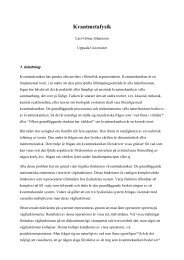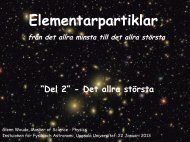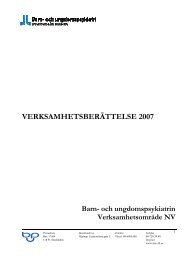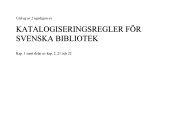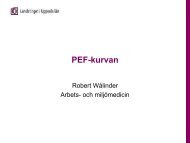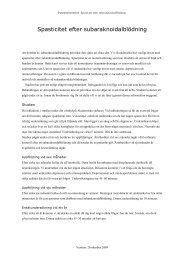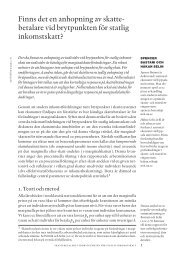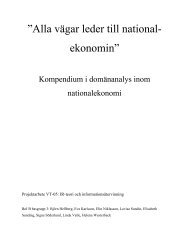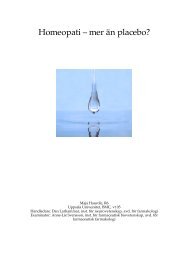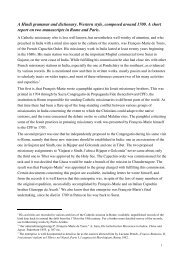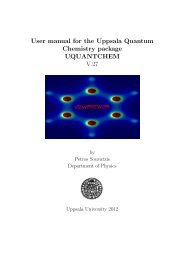Trans European Trends in Far Right Extremism
Trans European Trends in Far Right Extremism
Trans European Trends in Far Right Extremism
You also want an ePaper? Increase the reach of your titles
YUMPU automatically turns print PDFs into web optimized ePapers that Google loves.
Abstract<br />
<strong>Trans</strong> <strong>European</strong> <strong>Trends</strong> <strong>in</strong> <strong>Right</strong>-W<strong>in</strong>g <strong>Extremism</strong><br />
Michael Wh<strong>in</strong>e<br />
The development of <strong>in</strong>formation and communications technologies, the<br />
abolition of physical borders between <strong>European</strong> countries and the growth of<br />
youth cultures and their associated trapp<strong>in</strong>gs, are enabl<strong>in</strong>g right-w<strong>in</strong>g<br />
extremists to meet on l<strong>in</strong>e and face to face and create connections and jo<strong>in</strong>t<br />
activities. In so do<strong>in</strong>g, they have created the l<strong>in</strong>ks that a succession of rightw<strong>in</strong>g<br />
ideologues campaigned for but failed to achieve.<br />
<strong>Right</strong>-w<strong>in</strong>g extremists <strong>in</strong> Europe and America promoted trans-<strong>European</strong> and<br />
transatlantic l<strong>in</strong>ks after the end of the War, and the unity that they planned is<br />
now materialis<strong>in</strong>g among neo-Nazis and small violent white supremacist<br />
groups, <strong>in</strong>clud<strong>in</strong>g politicised sk<strong>in</strong>heads. Whereas their focus had been on<br />
unit<strong>in</strong>g white <strong>European</strong>s and their descendents aga<strong>in</strong>st common opponents,<br />
right-w<strong>in</strong>g extremists are now mov<strong>in</strong>g towards shared life styles and activities.<br />
Introduction<br />
This paper exam<strong>in</strong>es the effects that the eas<strong>in</strong>g of Europe’s borders and the<br />
development of <strong>in</strong>formation and communications technologies are hav<strong>in</strong>g on<br />
the outlook and activities of right-w<strong>in</strong>g extremists. It will argue that these<br />
developments are the new ‘enablers’ allow<strong>in</strong>g white supremacists and neo-<br />
Nazis to connect and move closer to the cooperation that earlier extremists<br />
argued for, but failed to accomplish. Of course right-w<strong>in</strong>g extremists are not<br />
the only political activists who benefit. The extreme left has always been<br />
<strong>in</strong>ternationalist, and anti-globalisation protestors communicated and organised<br />
across borders to stage demonstrations and riots <strong>in</strong> Gothenburg (2000),<br />
Genoa (2001) and elsewhere. The extreme right however has not, and<br />
attempts to create endur<strong>in</strong>g <strong>in</strong>ternational collaboration have been less<br />
successful.<br />
The paper’s focus is on white supremacists, neo-Nazi groups and the youth<br />
cultures they frequently recruit from, rather than parties, although there may<br />
be l<strong>in</strong>ks between them. Their lifestyles are a consequence of easier<br />
1
movement and the adoption of contemporary cultures, most notably music<br />
and cloth<strong>in</strong>g. A trend toward focused terrorist violence is also emerg<strong>in</strong>g.<br />
1. <strong>European</strong> Collaboration<br />
In 1997, Leonard We<strong>in</strong>berg cautioned that the danger posed by the extreme<br />
right should not be m<strong>in</strong>imised, its lack of endur<strong>in</strong>g political success <strong>in</strong> Western<br />
Europe. He noted its dynamism and suggested that extremists’ exploitation of<br />
popular nationalist sentiment is limited and decl<strong>in</strong><strong>in</strong>g, and their concerns now<br />
focus on the presence of large numbers of non <strong>European</strong> immigrants whose<br />
presence is perceived to be an economic and cultural threat. He observed<br />
that ‘<strong>in</strong> some cases the rightists depict themselves as the defenders of<br />
<strong>European</strong> civilisation now threatened by Ottoman or Moorish <strong>in</strong>vaders.’ He<br />
also observed the grow<strong>in</strong>g animus toward the USA: ‘Not uncommonly these<br />
extreme rightists use the United States as a negative reference po<strong>in</strong>t. It is<br />
precisely America’s evolv<strong>in</strong>g multiculturalism that they wish to avoid for their<br />
own countries. 1<br />
In 1995, Peter Merkl suggested that the contemporary extreme right <strong>in</strong> Europe<br />
is largely new, and should be <strong>in</strong>vestigated accord<strong>in</strong>gly. He noted the<br />
read<strong>in</strong>ess with which many young right-w<strong>in</strong>g activists, and even politically<br />
unconnected sk<strong>in</strong>head gangs and soccer hooligans, reached for the old Nazi<br />
or fascist labels and utilised their flags and symbols while represent<strong>in</strong>g a new<br />
entity. Young people, particularly <strong>in</strong> post Communist states, have grown up <strong>in</strong><br />
a state of confusion amid collaps<strong>in</strong>g political and social values. They have<br />
therefore eagerly seized on ready-made images of ethnic identity, especially<br />
<strong>in</strong> an extreme form. 2<br />
Anthony Smith suggested that it is the ethnic vision that now underp<strong>in</strong>s<br />
Europe’s nationalisms. He noted that ethnicity fills up the ‘nationalist concept<br />
space’ <strong>in</strong> a manner that leaves little room for other looser conceptions or<br />
discourse of the nation. The idea that nations may be plural rather than<br />
culturally homogenous still makes little headway among Europe’s extreme<br />
right. It is the French concept of ethnie that predom<strong>in</strong>ates with its basis <strong>in</strong><br />
2
common racial, cultural, religious and historical experience. 3 This leaves no<br />
room for new immigrants, particularly those who openly preserve their religion<br />
and culture.<br />
We therefore see an emerg<strong>in</strong>g pan-<strong>European</strong> extreme-right identity, which<br />
claims to be based on common <strong>European</strong> histories, identities and cultures <strong>in</strong><br />
reaction to the <strong>in</strong>creas<strong>in</strong>g presence of new migrants and which is at times<br />
attracted to and <strong>in</strong>fluenced by the American extreme right, but also repelled<br />
by American cultural and economic hegemony.<br />
The extreme right failed to establish trans-<strong>European</strong> <strong>in</strong>stitutions before the<br />
War. Italian and British fascists attended an International Conference of<br />
Fascist Parties <strong>in</strong> 1932, and representatives from France, Norway and Ireland<br />
attended the 1934 Fascist International Congress <strong>in</strong> Montreux. 4 Dur<strong>in</strong>g the<br />
Spanish Civil War, British and other <strong>European</strong> sympathisers jo<strong>in</strong>ed the<br />
Friends of National Spa<strong>in</strong>, and members of the Irish Blue Shirt Movement<br />
jo<strong>in</strong>ed the Spanish Foreign Legion to fight aga<strong>in</strong>st the Republic. 5 But noth<strong>in</strong>g<br />
endur<strong>in</strong>g was created and the Axis alliance was primarily a strategic one.<br />
Further attempts to collaborate were made after 1945 when former Nazis and<br />
neo-Nazis sought to build a new Europe. Unlike the political unity sought by<br />
western powers, theirs was a unity based on pan <strong>European</strong>ism <strong>in</strong> the face of<br />
an ethnic, rather than a strategic threat. For a few, the idea of unit<strong>in</strong>g with the<br />
Soviet Union aga<strong>in</strong>st Ch<strong>in</strong>a also proved attractive. Latterly the preoccupation<br />
has been to unify aga<strong>in</strong>st the USA and globalis<strong>in</strong>g <strong>in</strong>fluences and to remove<br />
immigrant (particularly Muslim) communities.<br />
<strong>European</strong> collaboration among extreme-right groups after the War was<br />
particularly driven by the concern to unite aga<strong>in</strong>st the nationalisms that had<br />
long torn it apart, and as a reaction to the mount<strong>in</strong>g threat from the Soviet<br />
Union. Its proponents were former Nazis and their sympathisers.<br />
3
Among them, Francis Parker Yockey, the American lawyer seconded to the<br />
War Crime Trials who fled to Ireland after he openly sympathised with those<br />
he was prosecut<strong>in</strong>g. He argued <strong>in</strong> Imperium that the age of narrow<br />
nationalism was dead and that the organic development of a new Europe was<br />
necessary to save western civilisation. He wrote that:<br />
This is addressed to all Europe, and <strong>in</strong> particular to the culture bear<strong>in</strong>g<br />
stratum of Europe. It summons Europe to a world-historical struggle of<br />
two centuries’ duration. Europe will partake <strong>in</strong> this struggle either as a<br />
participant or as the booty for maraud<strong>in</strong>g powers from without. If it is to<br />
act, and not merely suffer <strong>in</strong> this series of gigantic wars, it must be<br />
<strong>in</strong>tegrated and there is only one way this can occur. 6<br />
In 1947 Yockey jo<strong>in</strong>ed Sir Oswald Mosley’s attempt to build a covert<br />
<strong>European</strong> network, but broke away <strong>in</strong> 1949 to establish the <strong>European</strong><br />
Liberation Front (ELF) with the aim of build<strong>in</strong>g an authoritarian united<br />
<strong>European</strong> state. Over the next three years he travelled between Europe and<br />
America, but the differences among the groups, and their often contradictory<br />
aims, led him to abandon the effort and to move to Egypt <strong>in</strong> 1953 where he<br />
jo<strong>in</strong>ed forces briefly with former SS Colonel Otto Skorzeny and former Nazi<br />
Major General Ernst Otto Remer. 7<br />
Whereas the ELF sought a pan <strong>European</strong> front of western states, Skorzeny<br />
and other former Nazi officials strove to build l<strong>in</strong>ks with the Arab world and<br />
Lat<strong>in</strong> America. He <strong>in</strong>fluenced the formation and development of the Spanish<br />
Circle of Friends of Europe (Circulo Espanol de Amigos de Europa –<br />
CEDADE), the neo-Nazi group that cont<strong>in</strong>ues to host <strong>European</strong> neo-Nazis at<br />
its annual gather<strong>in</strong>gs. The motivat<strong>in</strong>g impetus here was to build a world wide<br />
neo-Nazi <strong>in</strong>ternational together with potential allies <strong>in</strong> the Arab world, brought<br />
together by their shared hatred of communism and Jews. 8<br />
A third collaborative attempt was <strong>in</strong>itiated by former Belgian Nazi collaborator<br />
Jean Thiriart who established the Jeune Europe movement <strong>in</strong> the 1960s to<br />
unite <strong>European</strong> nationalists, but with the realisation that the trapp<strong>in</strong>gs of<br />
Nazism had to be discarded if the young were to be attracted. In particular he<br />
advocated a white Europe from the Atlantic to the Urals but without America.<br />
4
He forged an alliance with Adolf von Thadden, the German National<br />
Democratic Party (NDP) leader, and with Juan Peron, the exiled Argent<strong>in</strong>ian<br />
dictator, then liv<strong>in</strong>g <strong>in</strong> Madrid. Both urged the militarisation of the white<br />
struggle aga<strong>in</strong>st communism and non <strong>European</strong> migration <strong>in</strong>to Europe.<br />
Thiriart also <strong>in</strong>corporated elements of leftist th<strong>in</strong>k<strong>in</strong>g <strong>in</strong>to his evolv<strong>in</strong>g ideology<br />
and adopted the Palest<strong>in</strong>ian cause. Yasser Arafat’s PLO were seen at that<br />
time as the vanguard of the left struggle aga<strong>in</strong>st American imperialism, and<br />
<strong>in</strong>deed neo-Nazis, as well as leftists, went to Lebanon and Syria for terrorism<br />
tra<strong>in</strong><strong>in</strong>g <strong>in</strong> Palest<strong>in</strong>ian camps. 9 Thiriart’s works were also translated <strong>in</strong>to<br />
Russian and <strong>in</strong>fluenced the post War redevelopment of National Bolshevik<br />
ideology that re-emerged after the collapse of the Soviet Union.<br />
Whereas the earlier proponents of pan <strong>European</strong>ism excluded Russia from<br />
their plans, later activists sought to <strong>in</strong>corporate it. The Danish neo-Nazi, Povl<br />
Riis Knudsen, who succeeded George L<strong>in</strong>coln Rockwell <strong>in</strong> 1967 as leader of<br />
the World Union of National Socialists, wrote after his 1978 visit to Russia that<br />
The racial consciousness of the Russians, who are the dom<strong>in</strong>ant nation<br />
<strong>in</strong> the Soviet Union, def<strong>in</strong>itely promises a better prospect for the<br />
survival of the Aryan race than the visions of liberal and conservative<br />
American politicians ….It is true, of course, that Communism does not<br />
support racial pr<strong>in</strong>ciples <strong>in</strong> theory – but with Communism theory and<br />
practice are very different th<strong>in</strong>gs. 10<br />
By 1983, Remer who had returned to Germany, began to advocate<br />
collaboration with Russia to counter the threat from Asia. He too argued that<br />
communism should be no impediment and <strong>in</strong> do<strong>in</strong>g so <strong>in</strong>fluenced later<br />
generations of neo-Nazi ideologues seek<strong>in</strong>g a united Europe. This younger<br />
generation however were also <strong>in</strong>fluenced by the anti Americanism and anti<br />
capitalism of the emerg<strong>in</strong>g new left. 11<br />
Latterly it has been the Italian Roberto Fiore of the New Force (Forza Nuova)<br />
and German NDP leader Udo Voigt who have promoted <strong>European</strong> and<br />
<strong>European</strong> – Russian cooperation. In a spr<strong>in</strong>g 2008 jo<strong>in</strong>t press statement they<br />
hailed former President Put<strong>in</strong>’s muscular Russian nationalist policies. This<br />
followed Fiore’s <strong>in</strong>vitation to representatives of the Russian extreme right to<br />
5
meet <strong>in</strong> Rome <strong>in</strong> November 2007, to assist <strong>in</strong> ‘choos<strong>in</strong>g the guidel<strong>in</strong>es of<br />
<strong>in</strong>ternational politics for the next few years….and the end of American<br />
unipolarism and the birth of a <strong>European</strong> pole’. Fiore added that ‘for those who<br />
have eyes to see, it is clear that it is <strong>in</strong> Moscow reside our hopes for a new<br />
Europe.’ 12<br />
Some Russian extreme-right groups promote ties with Europe based on<br />
perceived shared racial and cultural identities, and there has been an<br />
<strong>in</strong>creas<strong>in</strong>gly apparent ideological transfer from East to West and evidence of<br />
national Bolshevist <strong>in</strong>fluences on <strong>European</strong> groups. 13 They stand <strong>in</strong> contrast<br />
to the Eurasianism of Aleksander Panar<strong>in</strong> and Aleksander Dug<strong>in</strong>. The former<br />
rejected cross fertilisation between Europe and Russia, while the latter<br />
additionally seeks alliances <strong>in</strong> the Middle East to offset American unipolar<br />
dom<strong>in</strong>ation. 14<br />
The ‘Ideological Pr<strong>in</strong>ciples’ of the Northern Brotherhood sums up the views of<br />
those seek<strong>in</strong>g ties.<br />
By position<strong>in</strong>g ourselves as pragmatic defenders of Russian nation<br />
<strong>in</strong>terests, we can’t skip consideration of more general context. And <strong>in</strong><br />
this context we are identically determ<strong>in</strong>ed as white racists…..Therefore,<br />
<strong>in</strong> be<strong>in</strong>g developed now world fight of cont<strong>in</strong>ents, races and<br />
civilisations, we support the fight of white humanity for survival, for the<br />
sav<strong>in</strong>g of white mank<strong>in</strong>d which is now under the threat of elim<strong>in</strong>ation or<br />
dissolution of its identity <strong>in</strong> the ma<strong>in</strong>stream of Southern colourful<br />
<strong>in</strong>vasion. 15<br />
Jaroslav Krejci noted <strong>in</strong> the early 1990s that extreme-right groups were<br />
cultivat<strong>in</strong>g friendly and mutually supportive contacts, as they were becom<strong>in</strong>g<br />
racially rather than ethno-l<strong>in</strong>guistically oriented. In this way he suggested they<br />
are now mak<strong>in</strong>g common cause.<br />
They therefore pose as determ<strong>in</strong>ed defenders of the purity of <strong>European</strong><br />
culture, a culture the very spirit of which they fail to understand….The<br />
new emerg<strong>in</strong>g identities have similar but also different roots to the<br />
class and identification politics that gave rise to Fascism and Nazism.<br />
Identity and exclusion feed on each other, even as social and<br />
6
economic pressures move Europe towards a more plural type of<br />
society. 16<br />
The political and class struggles of communists and fascists, the pursuit of<br />
strong totalitarian states and the reaction to mass unemployment is not what<br />
now unites contemporary right-w<strong>in</strong>g extremists. They are motivated more by<br />
the negative economic and political effects of globalisation and the prospect of<br />
unemployment brought about by the transfer of economic activity to low cost<br />
producers, reaction to an American dom<strong>in</strong>ated uniform culture, and the<br />
presence of new migrants whose cultures and religions are seen as alien to<br />
Europe.<br />
Despite some dim<strong>in</strong>ution of American extreme-right <strong>in</strong>fluence it is worth<br />
record<strong>in</strong>g that some streams ma<strong>in</strong>ta<strong>in</strong> a foothold. Christian Identity reta<strong>in</strong>s<br />
offshoots <strong>in</strong> Sweden, Belfast and London, as does the Church of the Creator<br />
<strong>in</strong> Sweden. 17 Two Americans who have worked to strengthen transatlantic<br />
l<strong>in</strong>ks are the late William Pierce, founder of the National Alliance, who<br />
encouraged l<strong>in</strong>ks with the BNP and NDP, and who told the NDP youth<br />
congress <strong>in</strong> October 1999 that ‘it is essential – not just helpful, but necessary<br />
– for genu<strong>in</strong>e nationalist groups everywhere to <strong>in</strong>crease their degree of<br />
collaboration across national borders.’ 18<br />
The other is former Ku Klux Klan leader David Duke, whose appeal to the<br />
American and <strong>European</strong> right to jo<strong>in</strong> together <strong>in</strong> his booklet Is Russia the key<br />
to White Survival, was a product of his visits there and to Ukra<strong>in</strong>e, which<br />
began <strong>in</strong> 1995. 19 These led him to establish groups to encourage transatlantic<br />
cooperation, the most recent of which is the <strong>European</strong>-American Unity and<br />
<strong>Right</strong>s Organisation (EURO). 20<br />
Chang<strong>in</strong>g social and economic conditions and these personal <strong>in</strong>itiatives are<br />
promot<strong>in</strong>g a convergence of right-w<strong>in</strong>g activity and many groups are<br />
beg<strong>in</strong>n<strong>in</strong>g to look and sound similar. Merkl noted <strong>in</strong> 1997 that ‘the new<br />
radical right (on both sides of the Atlantic) voice opposition to the rule of<br />
unresponsive Eurocrats <strong>in</strong> exactly the same way as the American right voices<br />
7
opposition to the decision makers of Wash<strong>in</strong>gton’ and that ‘If a Euro American<br />
radical right has not emerged as yet, one certa<strong>in</strong>ly appears on the horizon.’ 21<br />
However, for many <strong>European</strong> right-w<strong>in</strong>g extremists the United States is a<br />
negative reference po<strong>in</strong>t and it is precisely America’s evolv<strong>in</strong>g multiculturalism<br />
they wish to avoid for their own countries.<br />
2. Enabl<strong>in</strong>g processes<br />
I now turn to the processes that are enabl<strong>in</strong>g collaboration. In previous<br />
publications I have <strong>in</strong>dicated that elements with<strong>in</strong> the American extreme right<br />
had been the first to use the Internet to enable communication across vast<br />
distances, and at about the same time the German extreme right sought to<br />
use it to organise events and to evade scrut<strong>in</strong>y by law enforcement. I had also<br />
noted that the Internet enhanced capacity to unify disparate groups<br />
advocat<strong>in</strong>g violent extremism. 22<br />
Accord<strong>in</strong>g to the German security service<br />
The Internet has become the most important medium of<br />
communication for right w<strong>in</strong>g extremists, who use it to present<br />
themselves, make verbal attacks, carry on <strong>in</strong>ternal debates, and to<br />
mobilise attendance at their rallies and demonstrations. 23<br />
The Dutch Monitor Racism and <strong>Extremism</strong> notes that<br />
Many (Internet) forums form collaborative networks, some tighter than<br />
others, often with a hierarchical structure, <strong>in</strong> which all sorts of activities<br />
are undertaken or <strong>in</strong>itiated, just as <strong>in</strong> ‘real’ organisations. These<br />
activities can be exclusively digital, but they can also take place <strong>in</strong> the<br />
real world or <strong>in</strong> a comb<strong>in</strong>ation of the two. 24<br />
In the twenty first century the static medium of websites is <strong>in</strong>creas<strong>in</strong>gly be<strong>in</strong>g<br />
replaced by <strong>in</strong>teractive e-mail<strong>in</strong>g lists, discussion forums and the web 2.0<br />
social networks, such as MySpace, Facebook and the YouTube video-shar<strong>in</strong>g<br />
site. Researchers on both sides of the Atlantic are now not<strong>in</strong>g that neo-Nazis<br />
are <strong>in</strong>creas<strong>in</strong>gly us<strong>in</strong>g social network<strong>in</strong>g platforms to <strong>in</strong>filtrate and recruit the<br />
8
next generation. Chris Wolf of the American Anti Defamation League has<br />
commented that<br />
In today’s Web 2.0 world with user generated content, social network<br />
sites like Facebook and MySpace, mobile comput<strong>in</strong>g and always on<br />
connectivity every aspect of the Internet is be<strong>in</strong>g used by extremists of<br />
every ilk to repackage old hatreds and to recruit new haters…The<br />
emergence of new Internet technologies and their adoption by onl<strong>in</strong>e<br />
haters is much more pernicious than the static websites most of us<br />
have been focuss<strong>in</strong>g on over the years. 25<br />
The first <strong>in</strong>teractive extreme-right website was established by the American<br />
Stormfront <strong>in</strong> 1998, and <strong>in</strong> 2000, ‘Stormfront Nederland en Vlaanderen’ was<br />
established to l<strong>in</strong>k Dutch and Belgian neo-Nazis and although it never<br />
achieved the importance of its American orig<strong>in</strong>ator, it has served as a forum<br />
for promot<strong>in</strong>g hate speech. 26<br />
Redwatch and similar sites are the cause of mount<strong>in</strong>g concern <strong>in</strong> Europe.<br />
They name anti-Nazi opponents and journalists and publish their home<br />
addresses with the implicit expectation of them be<strong>in</strong>g physically attacked as<br />
has happened <strong>in</strong> the UK, Poland and the Czech Republic. 27<br />
In Spa<strong>in</strong>, compla<strong>in</strong>ts by a human rights organisation that one of its lead<strong>in</strong>g<br />
officials, and his home address, were listed on the site of the National Alliance<br />
aga<strong>in</strong> led to a police <strong>in</strong>vestigation, though no charges have been brought to<br />
date. 28 In Russia, similar websites have circulated the names and home<br />
addresses of judges, prosecution service officials and public figures, caus<strong>in</strong>g<br />
the General Prosecutor’s office to <strong>in</strong>itiate a crim<strong>in</strong>al <strong>in</strong>vestigation <strong>in</strong>to their<br />
activity <strong>in</strong> March 2008. 29<br />
Many of these sites are sophisticated, hosted abroad and mirrored elsewhere<br />
to avoid legal sanctions. One US-hosted Russian site, vdesyatku.net, was<br />
closed after compla<strong>in</strong>ts, but others, nordrus.org and nordrus.<strong>in</strong>fo, for example,<br />
are mirrored <strong>in</strong> both the USA and <strong>in</strong> S<strong>in</strong>gapore, and are now believed to be<br />
work<strong>in</strong>g on yet another fall-back site. 30<br />
9
The second enabl<strong>in</strong>g process flowed from the Schengen agreements of 1985<br />
and 1990. These abolished checks at the <strong>in</strong>ternal borders of five of the <strong>in</strong>itial<br />
signatory states (Belgium, France, Germany, Luxembourg and the<br />
Netherlands) and created a s<strong>in</strong>gle external border. Common rules regard<strong>in</strong>g<br />
visas, right of asylum and checks only at external borders were adopted to<br />
allow the free movement of persons with<strong>in</strong> them. A further eight states<br />
(Austria, Denmark, F<strong>in</strong>land, Greece, Italy, Portugal, Spa<strong>in</strong> and Sweden)<br />
signed the agreements between 1990 and 1996. The UK and Ireland are now<br />
also party to some aspects of the agreements. 31 The net effect of Schengen<br />
has been to allow <strong>European</strong>s to travel around, and to work with<strong>in</strong>, the area<br />
without border checks or other restrictions, as the architects of the<br />
agreements planned. Coupled with substantially cheaper travel costs,<br />
Schengen has facilitated trans-<strong>European</strong> migration and short-term visits <strong>in</strong> a<br />
way that was <strong>in</strong>conceivable to previous generations. Fans now th<strong>in</strong>k noth<strong>in</strong>g<br />
of cross<strong>in</strong>g Europe to watch a football game or a concert.<br />
3. <strong>Trends</strong><br />
The most obvious manifestations of these currents and enabl<strong>in</strong>g processes<br />
are: <strong>in</strong>ternational gather<strong>in</strong>gs, cloth<strong>in</strong>g, music, and violence.<br />
Pan-<strong>European</strong> associations also promote closer contact. One, the <strong>European</strong><br />
National Front was founded <strong>in</strong> 1999, and named after Yockey’s organisation.<br />
It claims Bulgarian, Dutch, French, German, Greek, Italian, Portuguese<br />
Romanian and Spanish affiliates and <strong>in</strong> August 2006 mobilised up to 10,000<br />
supporters for the Deutsche Stimme festival <strong>in</strong> Sachsen Germany. 32<br />
Meet<strong>in</strong>gs to mark historic anniversaries, such as Hitler’s birthday, attract<br />
<strong>in</strong>ternational participants. The annual August Wunseidel memorial march <strong>in</strong><br />
Bavaria to commemorate Rudolf Hess started <strong>in</strong> 2001 and attracted over<br />
4500 <strong>in</strong>ternational participants <strong>in</strong> 2004. In 2005 it was banned on the basis<br />
that the organisers’ <strong>in</strong>tention was to glorify Nazism. 33 The annual Dresden<br />
march commemorat<strong>in</strong>g the Allied bomb<strong>in</strong>g, organised by the German NPD<br />
attracted over 3000 <strong>in</strong> 2005, up to 6000 <strong>in</strong> 2008, and thousands are aga<strong>in</strong><br />
10
expected <strong>in</strong> 2009. Participants <strong>in</strong>clude sk<strong>in</strong>heads and neo-Nazis from all over<br />
Europe. The annual December march through the Stockholm suburb of Salem<br />
commemorat<strong>in</strong>g the murder of White Power supporter and sk<strong>in</strong>head Daniel<br />
Wretstrom <strong>in</strong> 2000, acted both as a unify<strong>in</strong>g po<strong>in</strong>t for the Swedish extreme<br />
right, and attracted participants from elsewhere <strong>in</strong> Europe. 34 But the numbers<br />
of foreign participants <strong>in</strong> national manifestations may now be fall<strong>in</strong>g because<br />
of exclusions by national law enforcement agencies.<br />
However parade bans <strong>in</strong> one country can lead to their transference<br />
elsewhere, allow<strong>in</strong>g neighbour<strong>in</strong>g groups to l<strong>in</strong>k. German neo–Nazis marched<br />
with the Dutch People’s Union (Nederlandse Volks-Unie - NVU) through<br />
Dutch towns and cities <strong>in</strong> 2001 and 2002, enabl<strong>in</strong>g them to evade a ban <strong>in</strong><br />
Germany. 35<br />
Mass movement from east and central Europe <strong>in</strong>to the <strong>European</strong> Union,<br />
however short-lived and temporary has also encouraged right-w<strong>in</strong>g extremists<br />
to establish liaisons and bases beyond their national boundaries, as<br />
happened when Polish extreme-right groups held meet<strong>in</strong>gs <strong>in</strong> London <strong>in</strong> 2007<br />
and 2008.<br />
The transnational cloth<strong>in</strong>g brands adopted by sk<strong>in</strong>heads and neo-Nazis such<br />
as Lonsdale, Pit Bull and Thor Ste<strong>in</strong>ar, promote a common identity with<strong>in</strong> the<br />
extreme right. Groups us<strong>in</strong>g these brands, sometimes referred to as ‘Lonsdale<br />
youth’ (or Gabbers <strong>in</strong> the Netherlands) were not <strong>in</strong>itially a target for<br />
recruitment by neo-Nazi groups, <strong>in</strong> part because of their drug use. 36 The<br />
German security service describe the relationship between sk<strong>in</strong>s and neo-<br />
Nazis as an ambivalent one; the immediate attraction for sk<strong>in</strong>s is a lifestyle<br />
based on action and spontaneous violence, with easy access to drugs and<br />
music. Only rarely did they develop firmly held ideological views or target their<br />
political efforts <strong>in</strong> any more specific sense. But the picture has changed <strong>in</strong><br />
recent years as more have become radicalised and they now constitute an<br />
important recruitment arena. 37 Therefore at a local level, sk<strong>in</strong>head cloth<strong>in</strong>g<br />
and music provides a route <strong>in</strong>to neo-Nazism and a transnational identity.<br />
Accord<strong>in</strong>g to a German security service assessment, they now play ‘an<br />
11
important role <strong>in</strong> consolidat<strong>in</strong>g groups of right-w<strong>in</strong>g youth will<strong>in</strong>g to use<br />
violence’ <strong>in</strong> the Netherlands, Sweden and Germany. 38<br />
There is no suggestion that the cloth<strong>in</strong>g brands’ owners are complicit <strong>in</strong> the<br />
promotion of right-w<strong>in</strong>g extremism. Their sales strategies however clearly<br />
recognise potential markets, and rely on accepted neo-Nazi and Norse<br />
symbols. For this reason Mediatex, the German manufacturer of Thor Ste<strong>in</strong>ar<br />
successfully resisted a law suit brought by the Norwegian government which<br />
sought to ban their promotional use of the Norwegian flag, although the<br />
company later decided not to use the national symbol of Norway. 39<br />
The third trend, sk<strong>in</strong>head or white power music, provides a unify<strong>in</strong>g ideology,<br />
a common language, and a perfect example of globalisation. Developed <strong>in</strong><br />
1980s Brita<strong>in</strong>, white power music has grown <strong>in</strong>to a multi million Euro <strong>in</strong>dustry,<br />
and helps to fund violent extremist groups. Accord<strong>in</strong>g to Interpol the <strong>in</strong>dustry<br />
was worth £3.4 million a year <strong>in</strong> 1999, and it certa<strong>in</strong>ly grew for some years<br />
thereafter. 40<br />
Dev<strong>in</strong> Burghardt has noted that ‘the music scene has created <strong>in</strong>ternational<br />
ties where there were none, and has <strong>in</strong>spired an ideological pan-Aryanism<br />
that has broken down the walls between racist groups’. 41 The Swedish<br />
security service likewise regards music as ‘one of the most important tools<br />
when it comes to spread<strong>in</strong>g the movement’s ideas.’ 42<br />
Disks are recorded <strong>in</strong> one country, pressed <strong>in</strong> a second and retailed <strong>in</strong> a host<br />
of others and concerts attract <strong>in</strong>ternational audiences. For example,<br />
Hammerfest 2000 organised near Atlanta New Jersey by Panzerfaust<br />
Records and Resistance Records, drew fans from Austria, Canada, France,<br />
Ireland, the Netherlands and Spa<strong>in</strong>, and bands from the UK.43<br />
The transnational nature of the production and distribution processes were<br />
revealed <strong>in</strong> February 2003 when a shipment of <strong>in</strong>flammatory CDs was seized<br />
at Frankfurt airport. They had been produced by a German neo-Nazi<br />
domiciled <strong>in</strong> Thailand who had sent them to Sweden for distribution <strong>in</strong><br />
12
Germany and elsewhere.44 William Pierce recognised the transnational<br />
possibilities of attract<strong>in</strong>g young alienated racists and neo-Nazis, and the<br />
money-mak<strong>in</strong>g potential of music. In 1999 he purchased the Swedish<br />
Nordland Records and merged it with his successful Resistance Records.<br />
Dur<strong>in</strong>g 2000, he sought a bus<strong>in</strong>ess deal with Hendrik Mobus, a German neo-<br />
Nazi. In a radio broadcast on 9 September 2000, Pierce stated that they had<br />
planned to ‘establish new outlets <strong>in</strong> Europe’ for (Pierce’s) records and were<br />
discuss<strong>in</strong>g ‘the role of music <strong>in</strong> our overall effort’. Their grand plans however<br />
were never properly realised and Pierce died shortly thereafter.45<br />
The progenitor of the White Power music scene, Blood and Honour (B&H),<br />
founded by the late Ian Stewart Donaldson <strong>in</strong> the late 1980s, has grown from<br />
its UK orig<strong>in</strong>s <strong>in</strong>to a trans–<strong>European</strong> and transatlantic movement with<br />
offshoots <strong>in</strong> the Netherlands, Belgium, Sweden, United K<strong>in</strong>gdom, and the<br />
USA.46 Recent <strong>in</strong>ternal schisms however have now resulted <strong>in</strong> two B&H<br />
<strong>in</strong>ternational associations: one aligned to the traditional sk<strong>in</strong>head network; the<br />
other closely aligned to the political and more extreme Combat 18,<br />
Terrormach<strong>in</strong>e and the Racial Volunteer Force (RVF). Although their activities<br />
take place <strong>in</strong> a mostly non political twilight zone, some adherents moved <strong>in</strong>to<br />
overt political activity <strong>in</strong> spr<strong>in</strong>g 2006, when Dutch and German members<br />
attempted to lay a wreath at the German military cemetery <strong>in</strong> Ysselsteyn near<br />
Limburg, prior to a concert organised by B&H Flanders. Arrests of Belgian<br />
B&H members <strong>in</strong> the same year reportedly averted a planned terrorist<br />
attack.47<br />
Accord<strong>in</strong>g to Merkl,<br />
There is little doubt that the vast majority of new recruits to the various<br />
<strong>European</strong> radical right groups is male, lower class and very young.’<br />
(Merkl p36) In the case of East Germany, the extreme youth of many<br />
extreme-right activists makes them more vulnerable to anti foreigner<br />
rock music. Helmut Willen’s 1400 person case study noted that over<br />
75% of sk<strong>in</strong>heads are under 21 years and that 50% of these are under<br />
18 years. The lack of education as well as the extreme youth of violent<br />
racists <strong>in</strong> Germany appears to be replicated <strong>in</strong> Sweden and the<br />
Netherlands.48<br />
13
Realisation at government levels that rock music events were act<strong>in</strong>g as an<br />
<strong>in</strong>cubus for racist violence has led to police action, and <strong>in</strong> recent years their<br />
number has decl<strong>in</strong>ed and the number of concerts played by foreign groups <strong>in</strong><br />
Germany, for example, has fallen.49 However there has been no dim<strong>in</strong>ution <strong>in</strong><br />
the number of concerts played by German groups <strong>in</strong> Germany itself, despite<br />
large scale bann<strong>in</strong>g of CDs and sk<strong>in</strong>head literature.50<br />
4. Street Violence to Terrorism<br />
The fourth by-product of these processes is the trend to violence. Street<br />
violence has always been part of the neo-Nazi scene: it provides a focus for<br />
hatred and thereby draws <strong>in</strong> new adherents, but the emerg<strong>in</strong>g trend <strong>in</strong>volves a<br />
move beyond the anti foreigner street violence of the 1990s towards a more<br />
focused violence, which <strong>in</strong>cludes terrorism, and which is spurred by different<br />
reasons.51<br />
Tore Bjorgo noted <strong>in</strong> 1995 that the <strong>in</strong>creas<strong>in</strong>g support for xenophobic and<br />
radical-right parties enabled the growth of militant neo-Nazi organisations and<br />
networks which targeted asylum seekers and visible m<strong>in</strong>orities with<strong>in</strong> Europe.<br />
He further observed that groups perceived as ‘right w<strong>in</strong>g’ or ‘racist’ often<br />
turned out to have no connections with extreme political organisations, and<br />
only a rudimentary idea of any ideology. He suggested that def<strong>in</strong><strong>in</strong>g the<br />
essence of right-w<strong>in</strong>g extremism <strong>in</strong> terms of one s<strong>in</strong>gle issue, value or<br />
philosophical idea would prove to be a frustrat<strong>in</strong>g exercise. Rather, he<br />
suggested, that theirs ‘is an anger aga<strong>in</strong>st perceived outsiders, or the state,<br />
which could take a violent path.’52<br />
At the same time, the late Ehud Spr<strong>in</strong>zak suggested that violent, extreme<br />
right-w<strong>in</strong>g groups are organised around the belief that the object of their<br />
<strong>in</strong>tense opposition is a priori illegitimate, that they do not belong to the same<br />
humanity as themselves, and should therefore be kept <strong>in</strong> an <strong>in</strong>ferior legal<br />
state, expelled or even elim<strong>in</strong>ated. He further observed that their violence may<br />
be directed towards the ‘<strong>in</strong>ferior’ group, or it may be directed aga<strong>in</strong>st the<br />
political authority which has allowed such a situation to develop. 53<br />
14
Evidence <strong>in</strong> recent crim<strong>in</strong>al trials and security services’ reports suggests that<br />
elements with<strong>in</strong> the extreme right are prepar<strong>in</strong>g and tra<strong>in</strong><strong>in</strong>g for what they<br />
perceive to be a com<strong>in</strong>g war for ‘white survival’. Few crim<strong>in</strong>al justice agencies<br />
publish data on this specifically, or differentiate it from other forms of violent<br />
crime, but the exceptions are the Swedish and German security services. 54<br />
Their reports note that with<strong>in</strong> established extreme-right bodies there are now<br />
<strong>in</strong>dividuals, or small groups, who are plann<strong>in</strong>g and prepar<strong>in</strong>g for acts of<br />
terrorism us<strong>in</strong>g firearms and improvised explosive devices that are more<br />
sophisticated than petrol bombs or other forms of missile previously<br />
associated with extreme-right violence. This new trend stands <strong>in</strong> stark<br />
contrast to earlier perceptions when several <strong>European</strong> security services<br />
reported an ambivalence towards the use of violence.<br />
The move to terrorism is not perceived to be a substantive challenge to the<br />
state, but rather an attack on symbols of the state and a reaction to the <strong>in</strong>flux<br />
of migrants, particularly Muslims. In Sweden, for example, four neo-Nazis<br />
were charged <strong>in</strong> early 2005 <strong>in</strong> connection with a terrorist plot to attack the<br />
parliament build<strong>in</strong>g and schools, but for evidentiary reasons were convicted<br />
only of caus<strong>in</strong>g crim<strong>in</strong>al damage. 55<br />
The Swedish security police therefore noted <strong>in</strong> 2006 that<br />
Both the White Power scene and the autonomous scene conta<strong>in</strong> actors<br />
who have shown that they are prepared to use threat, violence or force<br />
to atta<strong>in</strong> their political objectives. In some cases their actions are<br />
directed aga<strong>in</strong>st authorities or political parties represented <strong>in</strong><br />
parliament. 56<br />
This new trend is neither widespread nor does it <strong>in</strong>volve large numbers, but is<br />
the consequence of a small m<strong>in</strong>ority act<strong>in</strong>g out their extreme ideology. It is<br />
however planned and coord<strong>in</strong>ated at a national and an <strong>in</strong>ternational level, and<br />
it is the Internet that enables and strengthens the processes. A Europol report<br />
noted <strong>in</strong> 2006 that<br />
15
Although violent acts perpetrated by right-w<strong>in</strong>g extremists and terrorists<br />
may appear sporadic and situational, right-w<strong>in</strong>g extremist activities are<br />
organised and transnational. 57<br />
The <strong>in</strong>spiration for many is the ‘leaderless resistance’ model of small cells or<br />
s<strong>in</strong>gle <strong>in</strong>dividuals (‘lone wolves’) us<strong>in</strong>g terror tactics to resist central<br />
government suggested by US extreme-right theoretician Louis Beam, and the<br />
messages conta<strong>in</strong>ed <strong>in</strong> TheTurner Diaries and Hunter, two novels written by<br />
William Pierce, under the pseudonym of Andrew Hunter. The former depicts a<br />
violent revolution to overthrow the US federal government and to exterm<strong>in</strong>ate<br />
Jews and non-whites; the latter describes a targeted assass<strong>in</strong>ation campaign<br />
of couples <strong>in</strong> <strong>in</strong>ter-racial marriages and civil rights activists carried out by a<br />
Vietnam war veteran who is drawn <strong>in</strong>to a white nationalist group plann<strong>in</strong>g<br />
<strong>in</strong>surrection. 58<br />
The murder of Theo van Gogh, and the July 7 London bomb<strong>in</strong>gs galvanised<br />
neo-Nazi groups around Europe although the immediate reaction did not lead<br />
to the extreme violence that security agencies predicted. There was however<br />
an <strong>in</strong>crease <strong>in</strong> low-level violence, and anti-Muslim demonstrations <strong>in</strong> many<br />
countries, especially <strong>in</strong> the Netherlands and United K<strong>in</strong>gdom. The Dutch<br />
security service and the annual Dutch Racism and <strong>Extremism</strong> Monitor both<br />
reported a discernible move by activists to ‘tougher, violence-prone neo-Nazi<br />
groups’ which are ‘just a fraction removed from terrorism.’59 The acquisition<br />
of arms, bomb-mak<strong>in</strong>g materials and military manuals has been noted <strong>in</strong><br />
several states, although the degree to which they will use them is another<br />
matter, and their possession may be more apparent than their will<strong>in</strong>gness and<br />
capability to deploy them. Dur<strong>in</strong>g April and July 2005, the German authorities<br />
confiscated large caches of arms and explosives <strong>in</strong> raids on the homes of<br />
neo-Nazis, but commented after that the <strong>in</strong>tention appears to have been to<br />
stockpile arms rather than use them immediately. They also noted that some<br />
right-w<strong>in</strong>g extremists reject terrorist activity which could lead to <strong>in</strong>creased<br />
surveillance by the state.60 In the UK, the police also foiled a succession of<br />
terrorist plots <strong>in</strong>itiated by extreme-right activists.61<br />
16
Nevertheless, the German authorities report that extreme-right activists are<br />
<strong>in</strong>creas<strong>in</strong>gly prepared to resort to violence, to obta<strong>in</strong> weapons and to engage<br />
<strong>in</strong> paramilitary exercises, as tra<strong>in</strong><strong>in</strong>g for terrorism.62<br />
The will<strong>in</strong>gness to employ extreme violence <strong>in</strong> defence of <strong>European</strong> ‘values’ is<br />
apparent <strong>in</strong> the ideology of several groups, among them the British Patriots of<br />
the White <strong>European</strong> Resistance (POWER), which emerged <strong>in</strong> 2006, and<br />
which claims supporters <strong>in</strong> Croatia, Netherlands, Norway, Poland, Serbia,<br />
Switzerland, Slovenia, and Sweden. The British police have reported<br />
There is no <strong>in</strong>telligence to suggest that POWER is <strong>in</strong>strumental <strong>in</strong><br />
<strong>in</strong>fluenc<strong>in</strong>g known or alleged ‘Lone Wolf’ operatives. However POWER<br />
is a relatively new group who are difficult to regionalise and who have<br />
l<strong>in</strong>ks to cont<strong>in</strong>ental Europe.63<br />
The POWER website states that<br />
We began <strong>in</strong> Great Brita<strong>in</strong> but are a pro <strong>European</strong> movement with<br />
members <strong>in</strong> all <strong>European</strong> countries. … We were formed as a last<br />
chance movement to preserve our <strong>in</strong>dividual nations and to unify<br />
Europe and build the great nations and Europe we once had………We<br />
are not a Political party, and would consider ourselves freedom<br />
fighters, not the left w<strong>in</strong>g version of the term freedom fighters. Which<br />
are called Terrorists, we are defenders of the <strong>European</strong> culture.<br />
However we urge people to support National Socialism……….We are<br />
firm believers <strong>in</strong> the policies of Oswald Mosley and strongly support all<br />
of his theories on the state of Europe.64<br />
POWER identification of the enemy is shared with like-m<strong>in</strong>ded groups.<br />
The western world we feel is under threat from not only Jewish<br />
corruption but also from mass immigration, drug imports, religious<br />
divide, gun crime, Islamic hatred and multiculturalism <strong>in</strong> general, we<br />
firmly support all of Europe but refuse to accept that we owe any<br />
African anyth<strong>in</strong>g…….We stand alongside every <strong>European</strong> nation that<br />
wishes to remove non whites from their land….65<br />
The Revolutionary Volunteer Force (RVF) is a second trans-<strong>European</strong> group<br />
which emerged from the UK-based Combat 18, with branches <strong>in</strong> the UK,<br />
Germany, Belgium and the Netherlands, and which declares itself to be an<br />
<strong>in</strong>ternational ‘militant Pro White Organisation’, with its own <strong>European</strong> council.<br />
17
It h<strong>in</strong>ts that it will resort to violence and warns its members that they must<br />
th<strong>in</strong>k long and hard before jo<strong>in</strong><strong>in</strong>g.66 The Dutch security service identified its<br />
members as ‘strongly ideologically developed’ capable of play<strong>in</strong>g an important<br />
role <strong>in</strong> further<strong>in</strong>g and cement<strong>in</strong>g contacts.67<br />
The terrorist threat is not perceived to be a substantive challenge to the state,<br />
but rather an attack on the symbols of the state and a reaction to the <strong>in</strong>flux of<br />
migrants, particularly Muslims. It is not a widespread trend, nor is it<br />
coord<strong>in</strong>ated and planned at any central po<strong>in</strong>t. Rather, it is the consequence of<br />
small groups act<strong>in</strong>g out their extreme ideology.<br />
The 2008 Europol report on terrorist threats with<strong>in</strong> the <strong>European</strong> Union<br />
identified an <strong>in</strong>creas<strong>in</strong>g number of extreme-right terrorist plots <strong>in</strong> the United<br />
K<strong>in</strong>gdom dur<strong>in</strong>g the past ten years by <strong>in</strong>dividuals classified as ‘lone wolves’<br />
who share ‘an ideological or philosophical identification with an extremist<br />
group, but do not communicate with the group they identify with.’68<br />
They follow the models proposed by Beam and Pierce.<br />
Conclusions<br />
Contemporary cultural, economic and racial challenges with<strong>in</strong> Europe have<br />
allowed extremists to become more active once aga<strong>in</strong>. They have particularly<br />
spurred the growth of extreme nationalism and closer trans-<strong>European</strong><br />
cooperation among extreme-right groups. These processes are enabled by<br />
the growth of ICTs and the ease of travel, and their outward manifestations<br />
are seen <strong>in</strong> the meet<strong>in</strong>gs, rallies and cloth<strong>in</strong>g adopted by many. The enabl<strong>in</strong>g<br />
mechanisms also allow the move to violence. In these developments the<br />
<strong>European</strong> extreme right has been <strong>in</strong>fluenced by, and has copied its<br />
counterparts <strong>in</strong> America. Yet at the same time they have also opposed the<br />
globalis<strong>in</strong>g and Americanis<strong>in</strong>g <strong>in</strong>fluences on Europe which were regarded as<br />
a danger to <strong>European</strong> ethnic and cultural identity.<br />
18
The outward manifestations of youth cultures should not be seen as a threat<br />
<strong>in</strong> themselves. The disparate and often confrontational nature, and historical<br />
tendency to spl<strong>in</strong>ter with<strong>in</strong> the extreme right, reduce any political impact, but<br />
their violence is real and grow<strong>in</strong>g and does not <strong>in</strong>volve large numbers, only<br />
isolated <strong>in</strong>dividuals or small cells. This is emerg<strong>in</strong>g as a clearly def<strong>in</strong>ed trans<br />
<strong>European</strong> threat.<br />
In these activities the extreme right is achiev<strong>in</strong>g some of its goals and<br />
develop<strong>in</strong>g the realities that early proponents sought, but failed to realise.<br />
References<br />
19
1 We<strong>in</strong>berg,L.(1997), chapter <strong>in</strong> Merkl P.H. and We<strong>in</strong>berg L.(eds) The Revival of <strong>Right</strong>-<br />
W<strong>in</strong>g <strong>Extremism</strong> <strong>in</strong> the N<strong>in</strong>eties, Frank Cass, London, p.279<br />
2 Merkl P.H. op cit p.23<br />
3 Smith A.1995), The dark side of nationalism: the revival of nationalism <strong>in</strong> late twentieth-<br />
century Europe chapter <strong>in</strong> Cheles L., Ferguson R., Vaughan M. (eds) The Extreme right<strong>in</strong><br />
Western & Eastern Europe, 2nd Edition, Longman, London and New York, p.23<br />
4 Bar-0n,T.,(December 2003),Fascism to the Nouvelle Droite; The Dream of Pan-<br />
<strong>European</strong> Empire, Journal of Contemporary <strong>European</strong> Studies, Vol.16, No.3, p.233<br />
5 Keene, J. (2001), Fight<strong>in</strong>g for Franco:International Volunteers <strong>in</strong> Nationalist Spa<strong>in</strong> Dur<strong>in</strong>g<br />
the Spanish Civil War, 1936-39, Leicester University Press, London and New York, pp.2-7<br />
6 Yockey, F.P.(1948), Foreward to Imperium, available at http://reactor-<br />
core.org/imperium.html, downloaded 30 December 2008.<br />
7 Lee, M., The Beast Reawakens, (1997), Little, Brown and Company,<br />
London, pp 87 – 97<br />
8 ibid Lee, p156; see also Michael, G., (2006), The Enemy of My Enemy –<br />
The Alarm<strong>in</strong>g Convergence of Militant Islam and the Extreme <strong>Right</strong>,<br />
University Press of Kansas, Kansas.<br />
9 PLO Ties with neo- Nazi and <strong>Right</strong>ist Groups <strong>in</strong> Europe and the United<br />
States, (1976), Israel M<strong>in</strong>istry of Foreign Affairs, Jerusalem.<br />
10 ibid Lee, p167<br />
11 ibid Lee, pp209 – 211<br />
12 Bernabei, A (February 2008), International camp aims to provoke,<br />
Searchlight, London.<br />
13 Mathyl, M., (July 2002), The National Bolshevik Party and Arctogaia: two<br />
neo fascist groupuscules <strong>in</strong> the post-Soviet political space, Patterns of
Prejudice, Volume 36, Number 3, pp 62 – 76<br />
14 Peunova M. (December 2008), An Eastern Incarnation of the <strong>European</strong><br />
New <strong>Right</strong>: Aleksandr Panar<strong>in</strong> and the New Eurasionist Discourse <strong>in</strong><br />
Contemporary Russia, Journal of Contemporary <strong>European</strong> Studies,<br />
Vol 16, No.3, 407-419. See also<br />
Stack M., (4 September 2008), Russian Nationalist advocates Eurasian<br />
Alliance aga<strong>in</strong>st the US, Los Angeles Times.<br />
15 Ideological Pr<strong>in</strong>ciples of Northern Brotherhood, (31 July 2007),<br />
http://www.nordrus.<strong>in</strong>fo/tactics/detail.php?ID=1624&pr<strong>in</strong>t=Y, downloaded<br />
26 April 2008<br />
See also ‘Appeal to the right organisations and White nations of the<br />
Europe, http://www.nordrus.<strong>in</strong>fo/tactics/detail.ph?ID=1632&pr<strong>in</strong>t=Y,<br />
downloaded 26 April 2008<br />
16 Krejci,J. Neo-Fascism - West and East, chapter <strong>in</strong> The Extreme right<br />
In Western and Eastern Europe, op cit p.17<br />
17 Belfast published books promot<strong>in</strong>g the US Christian Identity Movement<br />
were on sale at the Orange Street Congregational Church,<br />
Leicester Square, London <strong>in</strong> September 2008.<br />
18 William Pierce: A Political History, Southern Poverty Law Center<br />
Intelligence Report,<br />
http://www.splcenter.org/<strong>in</strong>tel/<strong>in</strong>telreport/article.jspid=35pr<strong>in</strong>table=1,<br />
downloaded 25 May 2008.<br />
William Pierce, <strong>Extremism</strong> <strong>in</strong> America Series, Anti Defamation League,<br />
New York, http://www.adl.org/learn/ext_us/Pierce.asp, downloaded 25<br />
May 2008.<br />
19 Duke. D, (October 2000), ‘Is Russia the Key to White Survival’, The David<br />
Duke Report, Issue 47, Box 188, Mandeville, LA 70470.<br />
20 David Duke <strong>in</strong> Russia, (2001), Anti Defamation League, New York,<br />
http://www.adl.org/Anti_semitism/duke_russia.asp, downloaded 18 April<br />
2008.
Lee, M, (Spr<strong>in</strong>g 2003), The Wander<strong>in</strong>g Jew Hater, Intelligence Report,<br />
Southern Poverty Law Center, Ala,<br />
http://www.splcenter.org/<strong>in</strong>tel/<strong>in</strong>telreport/article.jsp?sid=21, downloaded<br />
18 April 2008<br />
21 Merkl P., op cit p.25-279<br />
22 Wh<strong>in</strong>e M. (1999), Cyberspace - A New Medium for Communication,<br />
Command and Control by Extremists, Studies <strong>in</strong> Conflict and Terrorism,<br />
Vol. 22, No.3, Taylor & Francis, USA<br />
Wh<strong>in</strong>e, M., (2000), The use of the Internet by <strong>Right</strong>-w<strong>in</strong>g extremists,<br />
chapter <strong>in</strong> Cybercrime: Law, Security And Privacy <strong>in</strong> the Information Age,<br />
eds. Brian Loader and Douglas Thomas, Routledge, London. Also<br />
available at http://www.ict.org.il/articles/articledet.cfm?articleid=413<br />
Wh<strong>in</strong>e, M., (2007), Common Motifs on Jihadi and Extreme rightWebsites,<br />
chapter <strong>in</strong> Hypermedia Seduction for Terrorist Recruit<strong>in</strong>g, NATO Science<br />
for Peace and Security Series, Vol 25, IOS Press, Amsterdam. Also<br />
available at http://www.thecst.org.uk/publications<br />
See also <strong>Right</strong>-w<strong>in</strong>g extremism on the Internet, (January 2000), Federal<br />
Office for the Protection of the Constitution, (Bundesamt fur<br />
Verfassungsschutz -BfV), Cologne. Also available at<br />
http://www.verfassungsschutz.de/publikationen/gesamt/page13.htm<br />
23 Annual Report on the Protection of the Constitution (2003), BfV, Federal<br />
M<strong>in</strong>istry of the Interior, p 24<br />
24 Monitor Racism & <strong>Extremism</strong> 7 th Report (2008) cit<strong>in</strong>g Kafka, Anne Frank<br />
Stichtung and Leiden University, Netherlands.<br />
25 Wolf C., (18 November 2008), presentation at the Global Summit on<br />
Internet Hate Speech, International Network Aga<strong>in</strong>st Cyberhate, French<br />
Embassy, Wash<strong>in</strong>gton D.C.<br />
26 Monitor Racism & <strong>Extremism</strong> 7 th Report
27 Redwatch – the site the traitors love to hate,<br />
http://www.redwatch.org/<strong>in</strong>dex2.html. See also<br />
Taylor, M., (4 October 2006), Web of Hate, guardian.co.uk,<br />
http://www.guardian.co.uk/technology/2006/oct/04/news.g2/pr<strong>in</strong>t,<br />
ATL Brief<strong>in</strong>g on Redwatch,<br />
http://www.atl.org.uk/atl_en/education/position_statements/redwatch.asp,<br />
downloaded 21 July 2008.<br />
28 El MCI sigue s<strong>in</strong> pronunciarse contra la <strong>in</strong>tolerancia, Alianza Nacional,<br />
17 April 2008, http://www.alianzanacional.es/ , downloaded 26 April 2008.<br />
29 The Neo-Nazi groups threaten State and Public Officials, (30 April 2008),<br />
SOVA Centre, Press Release, Moscow,<br />
http://xeno-sova-center.ru/6BA2468/6BB41EE/AFFE0C7,downloaded<br />
10 May 2005.<br />
30 Private communication between SOVA and author, 25 April 2008<br />
31 The Schengen area and cooperation, Activities of the <strong>European</strong> Union –<br />
Summaries of legislation,<br />
http://europea.eu/scadplus/leg/en/lvb/133020.htm, downloaded 31<br />
January 2009.<br />
32 Southgate T. (1999), Manifesto of the <strong>European</strong> Liberation Front,<br />
http://www.rosenoire.org/articles/elf.php downloaded 17 January 2009.<br />
NPD’s PresseFest <strong>in</strong> Sachsen,<br />
http://www.europannationalfront.org/?m==200608, downloaded 26 July<br />
2008.<br />
See also: Annual Report (2004), General Intelligence and Security Service<br />
(AIVD),The Hague, Netherlands.<br />
33 Kle<strong>in</strong>, M., (October 2005), Hess march banned <strong>in</strong> Wunseidel, Searchlight,<br />
Taschel, S., (October 2007), Ban shatters Hess commemoration plans,
Searchlight.<br />
34 Sweden deports German sk<strong>in</strong>heads, (9 December 2007), The Local:<br />
Sweden’s new <strong>in</strong> English, www.thelocal.se/5747/20061209, downloaded<br />
7 February 2009.<br />
35 AIVD 2001; AIVD 2002; Monitor Racism and <strong>Extremism</strong> 7 th Report.<br />
For cont<strong>in</strong>u<strong>in</strong>g liaison between German extreme rightgroups and others<br />
See International Connections section <strong>in</strong> successive BfV annual reports.<br />
36 Van Denselaar, J., (2004), The Lonsdale problem, Monitor<strong>in</strong>g Racism and<br />
<strong>Extremism</strong>, Leiden University; AIVD (2004).<br />
For background on the orig<strong>in</strong>s and <strong>in</strong>ternational connections of the<br />
sk<strong>in</strong>head movement see The Sk<strong>in</strong>head International – a worldwide survey<br />
of neo-Nazi sk<strong>in</strong>heads, (1995), ADL, New York.<br />
37 BfV 2003, P41; BfV pp23 – 24, Monitor Racism & <strong>Extremism</strong> 7th Report.<br />
38 BfV 2004, p23<br />
39 Wroe, D., (16 October 2008), Norway sues clothes firm popular with neo-<br />
Nazis, The Telegraph, London.<br />
Thor Ste<strong>in</strong>ar New Portal – Startseite,<br />
http://www.thorste<strong>in</strong>ar.net/pages/posts/thor-steianr-chef-doch-nicht-vor- gericht11.php,<br />
downloaded 31 July 2007.<br />
40 White Pride Worldwide, (Fall 2001), Intelligence Report, Southern<br />
Poverty Law Center, Ala, p 24; BfV 2005 pp 58 – 69.<br />
For useful background see also: Ware, V., & Back, L., (2002), Out of<br />
Whiteness, the University of Chicago Press, Chicago<br />
41 Burghardt, D., quoted <strong>in</strong> White Pride Worldwide.<br />
42 Annual Report 2002, Swedish Security Service (Sakerhetspolisen-<br />
SAPO), p 41.<br />
See also Glaser, T., Pfeiffer, T.,(2007), Erlebniswelt Rechts-extremismus,<br />
Wochenschau Verlag, Germany.
43. ibid World Pride Worldwide<br />
44. BfV 2003, p 46#<br />
45. ibid White Pride Worldwide<br />
46. Lowles, N., White Riot – the violent story of Combat 18, Milo Books,<br />
London<br />
47. Renard, T., (15 January 2008), Belgium and the Netherlands R<strong>in</strong>g <strong>in</strong> the<br />
New Year under the Shadow of Terrorism, Terrorism Focus, Volume 5<br />
Issue 2 , The Jamestown Foundation, USA. See also AIVD 2006, p. 53<br />
48. Merkl, P., p. 27 op cit<br />
49. BfV 2003, p. 45<br />
50. Raabe, J., (2007), Nazi Music empire expands, Searchlight.<br />
51. Merkl, P., p. 17, op cit<br />
52. Bjorgo, T., (1995), Terror from the Extreme <strong>Right</strong>, Frank Cass, London,<br />
p. 2.<br />
53. Bjorgo, T., p.4, op cit<br />
54. BfV annual reports and Offences related to national <strong>in</strong>ternal security,<br />
annual reports, SAPO.<br />
For historical background see Bjorgo, T., op cit.<br />
55. SAPO 2005, p. 7.<br />
56. SAPO 2006, p 23.
57. TE-SAT, EU Terrorism Situation and Trend Report 2007 and 2008,<br />
Europol. See also Counter-extremism, (2006), Danish Security<br />
Intelligence Service, Politiets Efterretn<strong>in</strong>gstjeneste (PET),<br />
www.pet.dk/English/Operational_tasks/extremism.aspx?udskriv+1,<br />
downloaded 9 December 2006.<br />
58. Beam, L., (1992), Leaderless Resistance, The Seditionist, Issue 12,<br />
http://www.louisbeam.com/leaderless.htm<br />
Macdonald,A., (1978), The Turner Diaries, National Vanguard Books,<br />
USA; Macdonald, A., (1989) Hunter, National Vanguard Books, USA.<br />
59. See for example: Monitor Racism & extremism, 7 th Report; AIVD 2005,<br />
2006, 2007.<br />
60. BfV 2005, p. 50.<br />
61. The Turner Diaries were a formative <strong>in</strong>fluence on former BNP and<br />
Combat 18 member David Copeland, the London Nail Bomber who was<br />
imprisoned for life <strong>in</strong> 1999 for plant<strong>in</strong>g three bombs <strong>in</strong> London which<br />
killed three and <strong>in</strong>jured over two hundred. Lance Crossley, a Nazi<br />
sympathiser from Manchester, was imprisoned for six years for<br />
possess<strong>in</strong>g an arsenal of guns and explosives <strong>in</strong> 2001; David Tovey, a<br />
BNP sympathiser, was imprisoned for eleven years for possess<strong>in</strong>g<br />
weapons <strong>in</strong> 2001; Alan Boyce, a former BNP and NF member was<br />
convicted of plann<strong>in</strong>g a bomb<strong>in</strong>g campaign aga<strong>in</strong>st a local immigrants<br />
hostel <strong>in</strong> 2006; Robert Cottage, a former BNP local election candidate was<br />
imprisoned <strong>in</strong> 2007 for stockpil<strong>in</strong>g bomb-mak<strong>in</strong>g chemicals for what he<br />
perceived to be the imm<strong>in</strong>ent war between British citizens and foreign<br />
migrants; Nathan Worrell, a far right sympathiser, was imprisoned <strong>in</strong> 2008<br />
for amass<strong>in</strong>g bomb mak<strong>in</strong>g chemicals; Martyn Gilleard, the British Peoples<br />
Party leader was imprisoned <strong>in</strong> 2008 for mak<strong>in</strong>g nail bombs and<br />
possession of ammunition for a firearm. It was stated that his computer<br />
password was ‘Martyn1488’, the 14 be<strong>in</strong>g a reference to the far right<br />
slogan ‘We must secure the existence of our race and a future for the
white people’ co<strong>in</strong>ed by the late David Lane, an American white<br />
supremacist. Police found that he had researched bomb mak<strong>in</strong>g<br />
techniques on the Internet, bought explosives materials and made four nail<br />
bombs with the <strong>in</strong>tention of bomb<strong>in</strong>g mosques, (BBC New 25 July 2008).<br />
62. BfV 2004, pp.39-41: BfV 2005, pp.49-50.<br />
63. Lone Wolves Brief<strong>in</strong>g Document, (7 April 2008), Association of Chief<br />
Police Officers National Community Tension Team (NCTT), London.<br />
64. P.O.W.E.R, http://www.14power88.com/vonherman/vwar/page.php?id=6,<br />
Downloaded 28 June 2007.<br />
65. ibid P.O.W. E.R.<br />
66. Racial Volunteer Force, http://wwwrvfonl<strong>in</strong>e.com/house.htm, downloaded<br />
8 May 2008.<br />
67. AIVD 2006, p.52<br />
68. TE-SAT 2008, p.39



